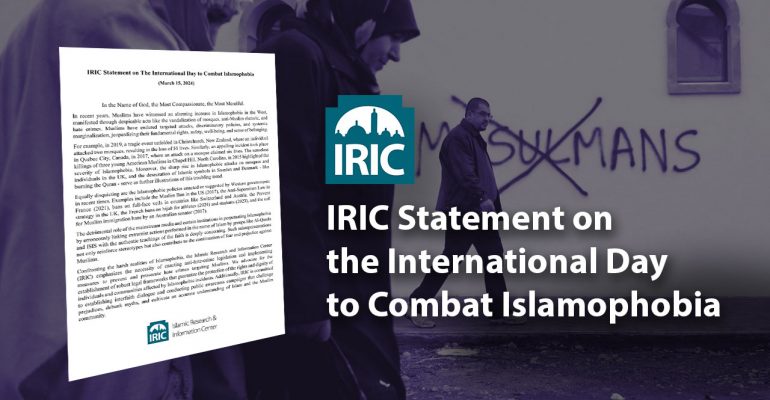IRIC Statement on the International Day to Combat Islamophobia
March 15, 2024 2024-03-15 1:23IRIC Statement on the International Day to Combat Islamophobia

IRIC Statement on the International Day to Combat Islamophobia
IRIC Statement on the International Day to Combat Islamophobia
March 15, 2024
In the Name of God, the Most Compassionate, the Most Merciful
In recent years, Muslims have witnessed an alarming increase in Islamophobia in the West, manifested through despicable acts like the vandalization of mosques, anti-Muslim rhetoric, and hate crimes. Muslims have endured targeted attacks, discriminatory policies, and systemic marginalization, jeopardizing their fundamental rights, safety, well-being, and sense of belonging.
For example, in 2019, a tragic event unfolded in Christchurch, New Zealand, where an individual attacked two mosques, resulting in the loss of 51 lives. Similarly, an appalling incident took place in Quebec City, Canada, in 2017, where an attack on a mosque claimed six lives. The senseless killings of three young American Muslims in Chapel Hill, North Carolina, in 2015 highlighted the severity of Islamophobia. Moreover, the sharp rise in Islamophobic attacks on mosques and individuals in the UK, and the desecration of Islamic symbols in Sweden and Denmark – like burning the Quran – serve as further illustrations of this troubling trend.
Equally disquieting are the Islamophobic policies enacted or suggested by Western governments in recent times. Examples include the Muslim Ban in the US (2017), the Anti-Separatism Law in France (2021), bans on full-face veils in countries like Switzerland and Austria, the Prevent strategy in the UK, the French bans on hijab for athletes (2024) and students (2023), and the call for Muslim immigration bans by an Australian senator (2017).
The detrimental role of the mainstream media and certain institutions in perpetuating Islamophobia by erroneously linking extremist actions performed in the name of Islam by groups like Al-Qaeda and ISIS with the authentic teachings of the faith is deeply concerning. Such misrepresentations not only reinforce stereotypes but also contribute to the continuation of fear and prejudice against Muslims.
Confronting the harsh realities of Islamophobia, the Islamic Research and Information Center (IRIC) emphasizes the necessity of enacting anti-hate-crime legislation and implementing measures to prevent and prosecute hate crimes targeting Muslims. We advocate for the establishment of robust legal frameworks that guarantee the protection of the rights and dignity of individuals and communities affected by Islamophobic incidents. Additionally, IRIC is committed to establishing interfaith dialogue and conducting public awareness campaigns that challenge prejudices, debunk myths, and cultivate an accurate understanding of Islam and the Muslim community.
As the Holy Quran reminds us: “O mankind! Indeed, We created you from a male and a female and made you nations and tribes that you may know one another. Indeed, the most noble of you in the sight of Allah is the most righteous of you.” (The Holy Quran, 49:13). This verse underlines the essence of our shared humanity and the beauty of diversity ordained by the Creator. It is our duty to nurture mutual understanding, respect, and harmony among all individuals. By recognizing our shared humanity and upholding the values of compassion and empathy, we can overcome the barriers of ignorance and intolerance fueling Islamophobia.
On the International Day to Combat Islamophobia, IRIC extends its solidarity to communities worldwide in condemning all forms of bias, discrimination, and animosity towards Muslims. As proponents of social justice and intercultural understanding, we stress the imperative of combating and eradicating Islamophobia. To observe this significant day, here are several practical suggestions:
- Actively commemorate the day by engaging in meaningful discussions, events, and activities that raise awareness about Islamophobia and promote dialogue.
- Encourage Western media outlets to invite intellectual Muslims for interviews, articles, or reports, providing platforms for sharing their perspectives and fostering a more nuanced understanding of Islam and Muslims.
- Develop media campaigns and educational materials aimed at dispelling myths and addressing the harms of Islamophobia within communities.
- Organize lectures, seminars, or workshops in educational institutions to educate students and faculty about the impact of Islamophobia and effective counterstrategies.
By implementing these practical suggestions, we can progress towards building bridges of empathy and eliminating misconceptions.
In conclusion, we call upon governments, civil society organizations, religious institutions, and individuals globally to unite in combatting Islamophobia and supporting initiatives that promote intercultural understanding and mutual respect. Let us collaborate in creating a future where Islamophobia is eradicated, and where unity and compassion guide our interactions with one another. May Allah illuminate our hearts and minds with righteousness, granting us the wisdom and fortitude to confront injustice and ignorance wherever they may arise.
Islamic Research and Information Center (IRIC)







